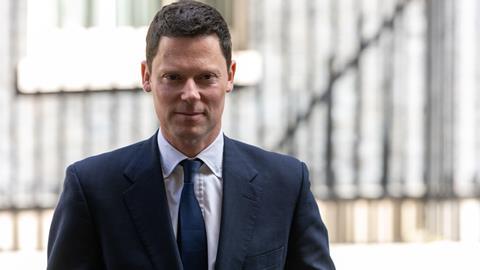New lord chancellor Alex Chalk gave few clues about any changes in direction of policy during his debut appearance taking justice questions in the House of Commons.
Chalk was asked about a number of topics during his first time answering justice questions since he replaced Dominic Raab last month, but was careful not to commit to any policy discussions at this stage.
Questioned specifically on the British Bill of Rights, a key pledge of Raab’s and still awaiting a second reading in the Commons, Chalk said: 'I am looking carefully at the full range of the department’s work before setting out plans in detail.'
It was reported earlier this month that Raab’s departure would sound the ‘death knell’ for the Bill of Rights.
MPs on both sides of the house urged Chalk to commit to keeping the Human Rights Act. Sir Bob Neill, chair of the Commons justice select committee, said the government’s priorities should be reducing the court backlog and protecting victims of crime rather than legislation, adding: ‘"If it ain’t broke don’t fix it" is not a legal maxim but it is still a sound one.’
Chalk was hesitant to commit to a timescale for the government’s long-promised legislation to reduce SLAPPs (strategic lawsuits against public participation). The lord chancellor said reforms such as costs protection might come through a new bill but could also be added to an existing bill already before parliament.
He added: ‘SLAPPs represent an abuse of the legal system as they rely upon threatening tactics to silence individuals. [But] you have to take care with this legislation and you have to take care to avoid unintended consequences.’
Chalk’s own quotes from his time as a backbencher, warning of the need for extra investment in legal aid, were brought up by the Labour benches.
Justice minister Mike Freer made an impassioned defence of the government’s record in response, saying the reality was that more public funds were being put into access to justice. He cited an extra £8.4m allocated to CAFCASS, £7.5m for family mediation and recruitment of judges across the justice system.
'I simply do not accept the premise that we are underfunding and cutting legal aid,' said Freer. 'In fact we are investing in it… any attempt to suggest we are not investing in the justice system is simply false.'
On the criminal courts backlog, Freer said figures released at the end of June will show the outstanding caseload to be falling, denying accusations that the government’s positive outlook on the backlog was mere rhetoric.



























